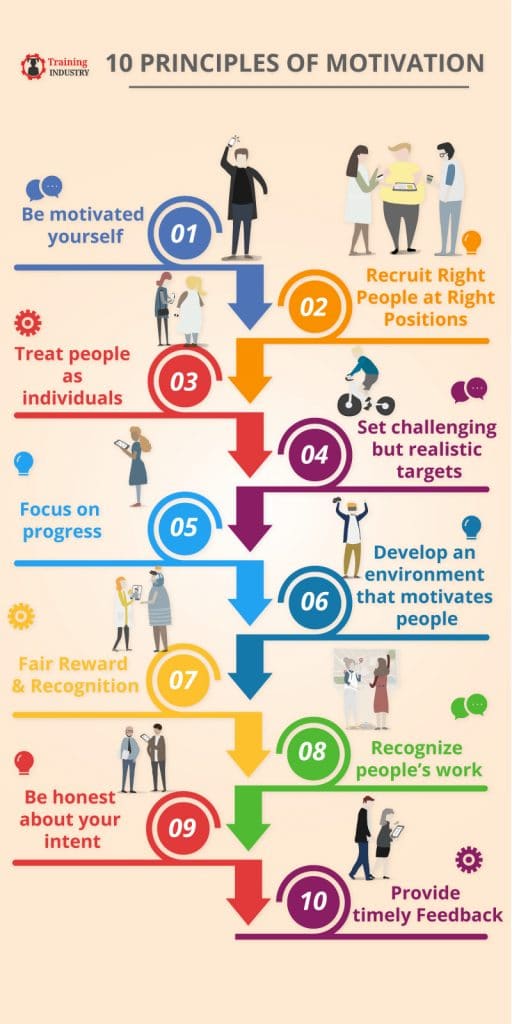Employee motivation or motivation at the workplace is a term quite often used in organizational context but rarely understood as it should be. Creating the right environment in business depends on motivating others. The question often asked is, Are there principles of Motivation, do they really exist?
What motivates people is a complex set of variables working for and against an individual but the answer to the above question is Yes. One individual can only do a limited set of things while the team can create outstanding results.
This makes it even more important to look at the principles of motivation, as getting the most out of others is crucial to success.
Also See: Employee Engagement-The three things that matter most to people at work
This all begins with winning
This requires planning and observation and knowing that each person is unique and they have different triggers to motivation. To motivate effectively, you need to know what motivates each individual, the pressures they face, what influences their decisions and thinking, and how you can make a difference.
These ten principles of motivation will help you to help your colleagues and self

1. Be motivated yourself Self-motivation rallies others.
Needless to say, you simply cannot motivate other people if you are not motivated yourself. Motivation here doesnt mean that you show overenthusiam over your goals but simply that you remain focused about your goals with a clear purpose.
People will ‘step up to the plate’ if you do so yourself. Knowing what motivates you will help you to motivate others. Motivation is viral, we derive energy from energetic people, we absorb enthusiasm from others and get enthusiastic. Motivation is as infectious as yawning.
2. Recruit people who are highly motivated and assign them to the right position
One of the common mistakes we make is to fill the position with whatever resources we have at our disposal. You want productivity, then you need to assign the right people for the right job.
Take your time and match people’s motivation for their job. Never discourage a self-motivated person by assigning them
Also, try to figure out what is the orientation of each individual. Some are motivated by making sales while others are motivated by following processes, building teams or pursuing new ideas.
3. Treat people as individuals
This is a very common mistake we all make. Most often you will here managers and leaders addressing their employees as department, roles, project or designation.
By doing so we are ignoring one of the most important
4. Set challenging but realistic targets
Nothing is more demotivating than unachievable targets. Nothing is more motivating than achievable, we-can-beat-the-competition targets – they tap into our competitiveness and desire to produce something to be proud of.
5. Focus on progress
it motivates Everyone responds to a pat on the back – they’ve earned it and deserve it, so make it happen. The result: an upward spiral of people wanting to achieve more.
6. Develop an environment that motivates people
Eliminate or minimize anything that blocks motivation – from bureaucracy and unnecessary procedures to lack of resources. Provide training and coaching to develop skills and to make people feel valued.
7. Fair Reward and Recognition
Ensure that people receive fair rewards a reason to stay and to help your company excel.
8. Recognize people’s work
We all want our efforts to be acknowledged. Recognition is needed to maintain the commitment levels.
9. Be honest about your intent
Honesty lies at the heart of motivation. Be clear about what your intentions are. People will be motivated only by those they can trust.
Sometimes it is not possible to communicate a message or full intent due to organizational policy or direction. In that case you may honestly tell the person that you can reveal only this much information at this moment and will update as soon as you can.
10. Provide timely Feedback
Feedback is very important to not only help others achieve the common goal but also to remain on track and improve gradually. But the feedback must be timely to ensure that the same is accepted by the invidual who receives the feedback.
Giving feedback is a skills in itself and there are other element like being specific, providing evidence etc, but as far as motivation is concerned, a timely feedback is utmost important.


